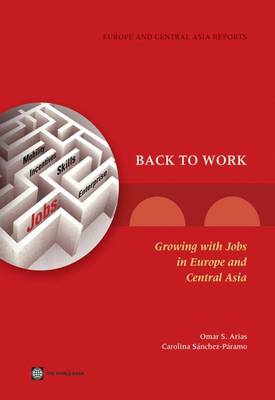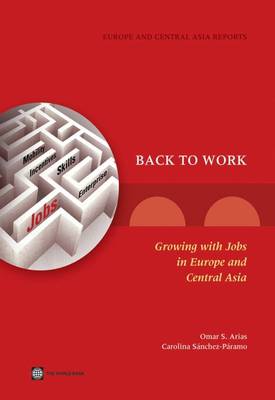
- Afhalen na 1 uur in een winkel met voorraad
- Gratis thuislevering in België vanaf € 30
- Ruim aanbod met 7 miljoen producten
- Afhalen na 1 uur in een winkel met voorraad
- Gratis thuislevering in België vanaf € 30
- Ruim aanbod met 7 miljoen producten
Zoeken
Back to Work
Growing with Jobs in Europe and Central Asia
Omar S Arias, Carolina Sánchez-Páramo, María E Dávalos, Indhira Santos, Erwin R Tiongson, Carola Gruen, Natasha de Andrade Falcão, Gady Saiovici, Cesar A Cancho
€ 48,45
+ 96 punten
Omschrijving
What can be done to create more and better jobs in Europe and Central Asia? And should there be specific policies to help workers access those jobs? The authors of this book examine these questions through the lens of two contextual factors: the legacy of centralized planned economies and the mounting demographic pressures associated with rapid aging in some countries and soaring numbers of youth entering the workforce in others. The authors find the following: - Market reforms pay off, albeit with a lag, in terms of jobs and productivity. - A small fraction of superstar high-growth firms accounts for most of the new jobs created in the region. - Skills gaps hinder employment prospects, especially of youth and older workers, because of the inadequate response by the education and training systems to changes in the demand for skills. - Employment is hindered by high implicit taxes on formal work and barriers that affect especially women, minorities, youth, and older workers. - Low internal labor mobility prevents labor relocation to places with greater job creation potential. Back to Work: Growing with Jobs in Europe and Central Asia asserts that to get more people back to work and to grow with jobs, countries, especially late reformers, need to regain the momentum for economic and institutional reforms that existed before the economic crisis. They should lay the fundamentals to create jobs for all workers, by pushing reforms to create the enabling environment for existing firms to grow, become more productive, or exit the market and let new firms emerge and succeed (or fail fast and cheap). They should also implement policies to support workers so that those workers are prepared to take on the new jobs being created, by having the right skills and incentives, unhindered access to work, and being ready to relocate.
Specificaties
Betrokkenen
- Auteur(s):
- Uitgeverij:
Inhoud
- Aantal bladzijden:
- 440
- Taal:
- Engels
- Reeks:
Eigenschappen
- Productcode (EAN):
- 9780821399101
- Verschijningsdatum:
- 17/01/2014
- Uitvoering:
- Paperback
- Formaat:
- Trade paperback (VS)
- Afmetingen:
- 178 mm x 251 mm
- Gewicht:
- 907 g

Alleen bij Standaard Boekhandel
+ 96 punten op je klantenkaart van Standaard Boekhandel
Beoordelingen
We publiceren alleen reviews die voldoen aan de voorwaarden voor reviews. Bekijk onze voorwaarden voor reviews.








